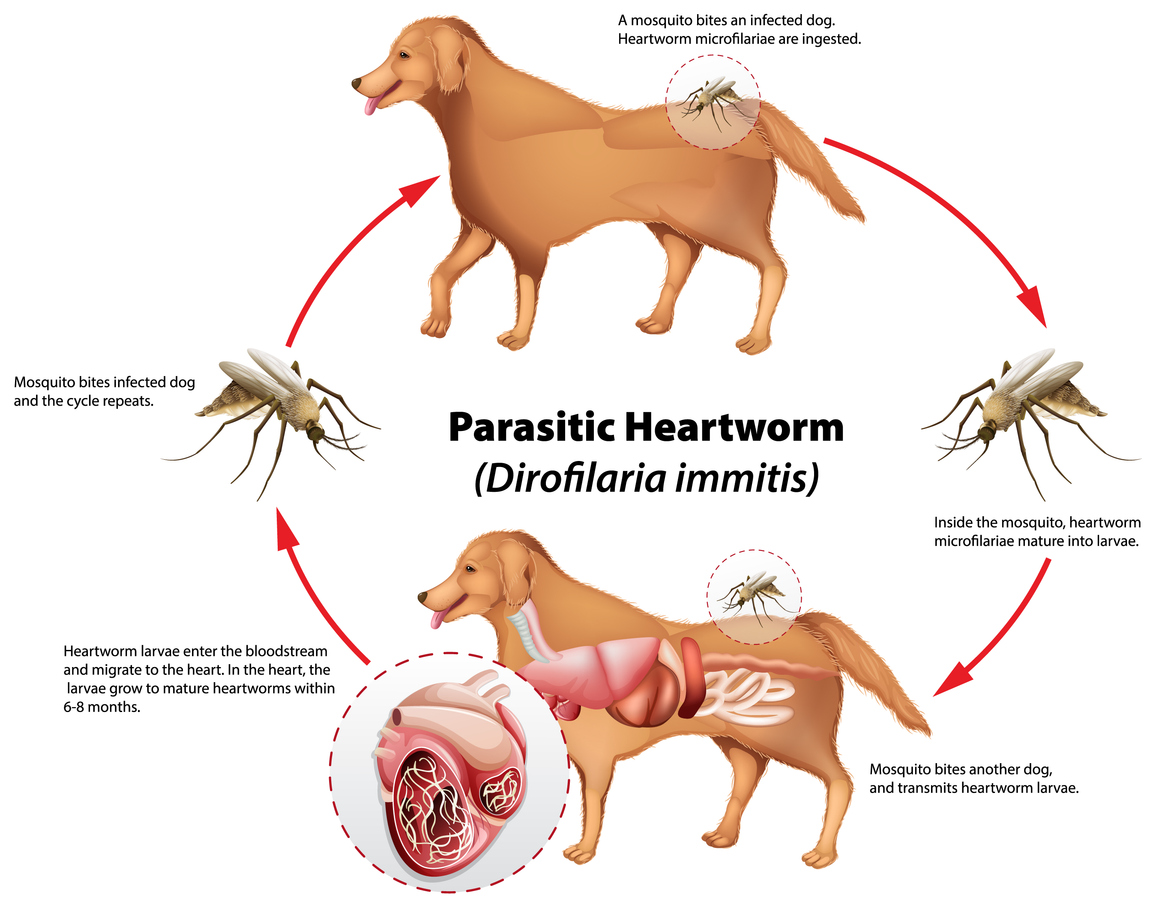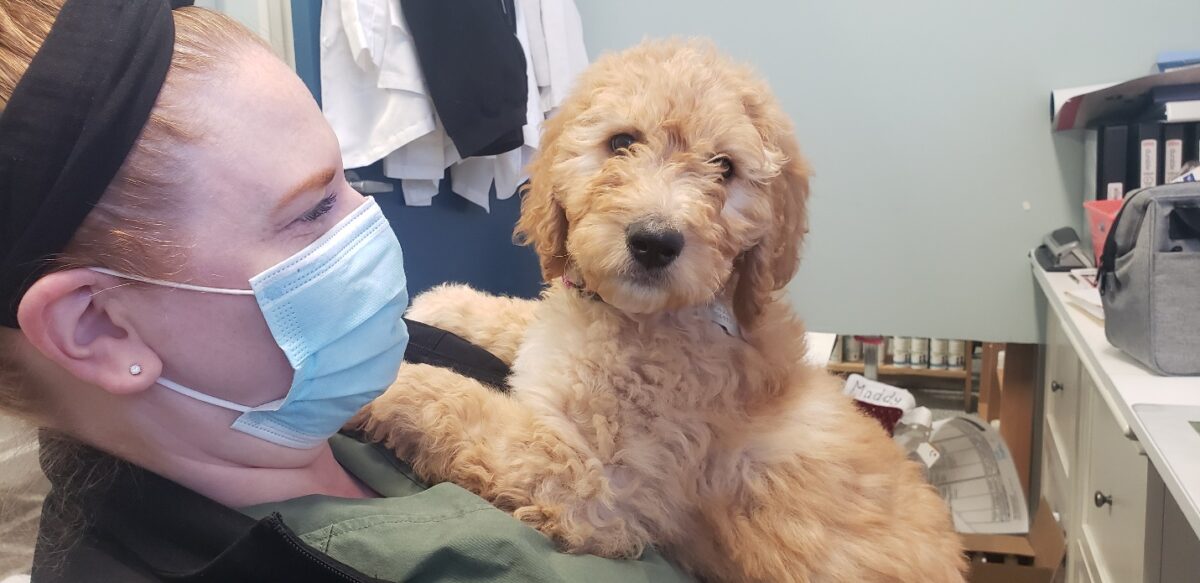In Santa Clarita –Valencia community’s sunny, warm climate, it is easy to enjoy time outdoors with your pets year-round. But along with the sunshine comes a hidden danger: mosquitoes. These tiny pests do more than annoy—they can transmit deadly parasites to your pet. At Cinema Veterinary Centre, we want every pet to enjoy a long, healthy life, which means taking preventative steps toward preventing heartworm disease before it strikes. Read on to discover how to protect your pets from this serious but preventable threat.
Understanding Heartworm Disease

Diagram showing parasitic heartworm illustration
Heartworm disease is a life-threatening condition caused by parasitic worms that live in infected animals’ hearts, lungs, and blood vessels. These worms are transmitted through the bite of a mosquito, making the risk especially high in warmer regions like Southern California.
When an infected mosquito bites your pet, it transmits microscopic heartworm larvae into the bloodstream. Over the next several months, these larvae grow into adult worms, some as long as 12 inches. As they mature, they interfere with the heart and lungs, eventually causing severe organ damage and potentially death if left untreated.
Dogs are the most common hosts, but heartworms can also infect cats and ferrets. In cats, even a single worm can lead to serious health problems. Because heartworm disease often develops silently over time, preventing it is far more effective than treating it after it has taken hold.
Signs of Heartworm Disease
Often called a “silent killer,” heartworm disease may not show signs until it has caused severe internal damage. Watch for the following symptoms:
In Dogs:
- Persistent coughing
- Fatigue after mild exercise
- Weight loss
- Loss of appetite
- In advanced stages, a swollen abdomen or signs of heart failure
In Cats:
- Coughing or asthma-like attacks
- Vomiting
- Decreased appetite or weight loss
- In severe cases, sudden collapse or death
In Ferrets:
- Lethargy and decreased appetite
- Hind leg weakness or paralysis
- Abdominal swelling
- Dark urine
If your pet displays any of these signs, contact Cinema Veterinary Centre immediately for evaluation and testing.
Diagnosis and Treatment Options

Detecting heartworm early makes a world of difference. At Cinema Veterinary Centre, we use several diagnostic methods, including:
- Blood tests to detect heartworm antigens or microfilariae
- X-rays to examine lung and heart structure
- Ultrasound to visualize adult worms in the heart
For Dogs:
Treatment involves multiple stages:
- Stabilization if your dog has severe symptoms
- Medications administered in a series of injections to eliminate adult heartworms
- Strict rest during recovery
- Follow-up testing to confirm the infection is cleared
For Cats and Ferrets:
Currently, there is no drug that can kill adult heartworms in cats or ferrets. Treatment focuses on:
- Managing symptoms with anti-inflammatory medication
- Providing supportive care such as oxygen therapy
- Regular monitoring to track disease progression
Due to the risks and limitations of treatment, preventing heartworm is always the better option.
Preventing Heartworm: What You Can Do

The great news is that heartworm disease is nearly 100% preventable with regular veterinary care and preventive measures. Here is how you can take action:
- Monthly Preventive Medications
These medications kill heartworm larvae before they can grow into adults. Available as chewables, topicals, or injections, they must be prescribed by a veterinarian.
- Annual Testing
Even pets on consistent prevention need yearly tests to ensure the medication is working and your pet is still heartworm-free.
- Mosquito Control
Mosquitoes are the sole transmitters of heartworms. Reduce your pet’s exposure by keeping your yard free of standing water and using pet-safe mosquito repellents. Keep pets indoors during dawn and dusk when mosquito activity is highest.
At Cinema Veterinary Centre, we customize prevention plans for each pet, ensuring the proper protection based on their lifestyle, age, and health.
Why a Prescription is Required
According to the American Veterinary Medical Association (AVMA), preventing heartworm safely requires a prescription. Giving preventive medication to an infected animal can lead to complications and will not eliminate existing adult worms. That is why annual testing and veterinary supervision are so important.
Skipping or delaying doses, even by a single month, could leave your pet vulnerable. Consistency is the cornerstone of preventing heartworm effectively.
Choose Cinema Veterinary Centre for Year-Round Heartworm Protection
At Cinema Veterinary Centre, we are passionate about helping your pets live their happiest, healthiest lives. With our warm California weather and active mosquito population, preventing heartworm is an essential part of responsible pet ownership. Our team is here to make it easy with personalized prevention plans, ongoing education, and compassionate care.
Let us help you take the worry out of heartworm season—because when it comes to your pet’s health, prevention is the best protection. Schedule your next appointment today and take the first step toward a heartworm-free future.
Cinema Veterinary Centre
25861 Railroad Ave, Suite 203
Santa Clarita, CA 91350

